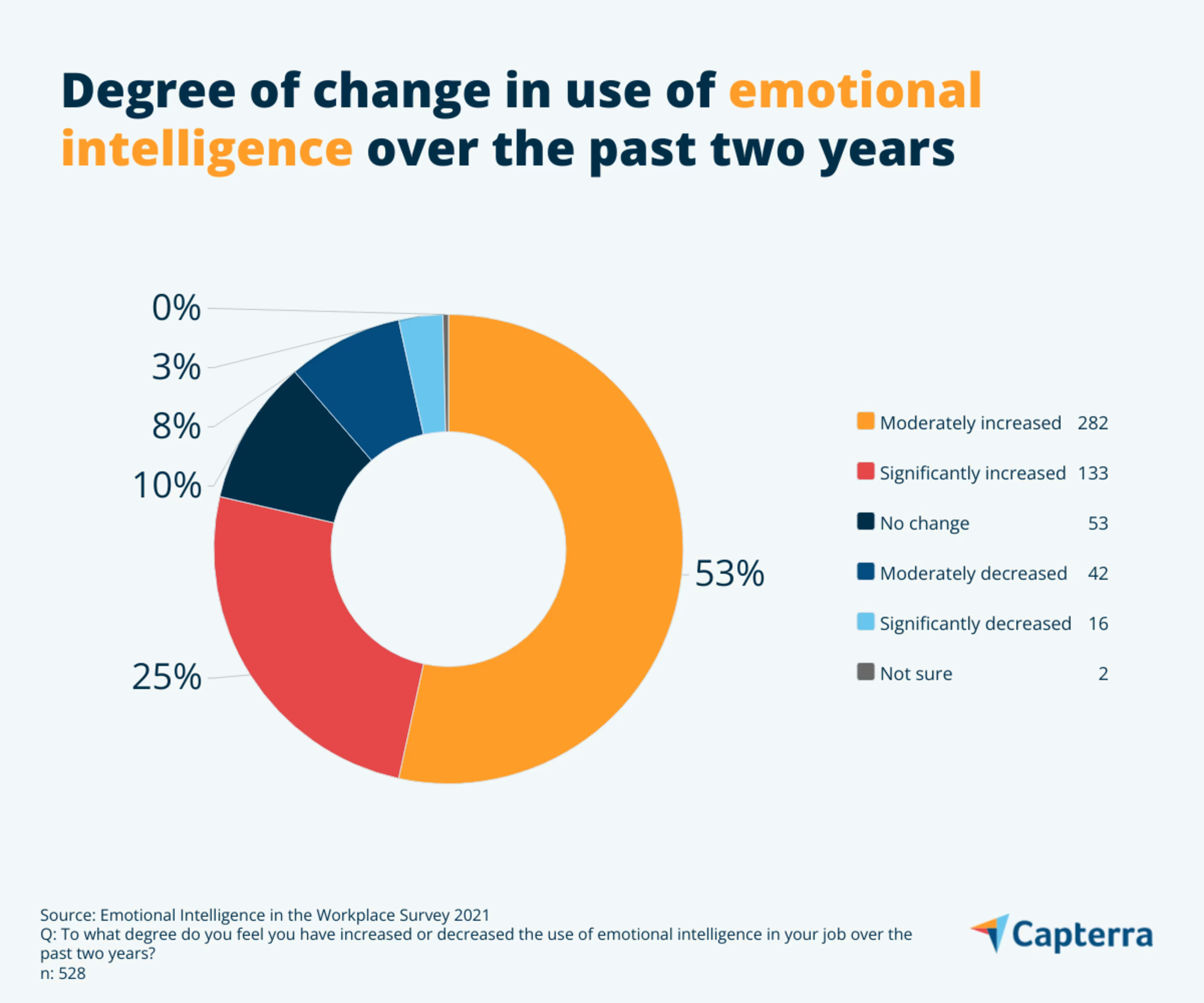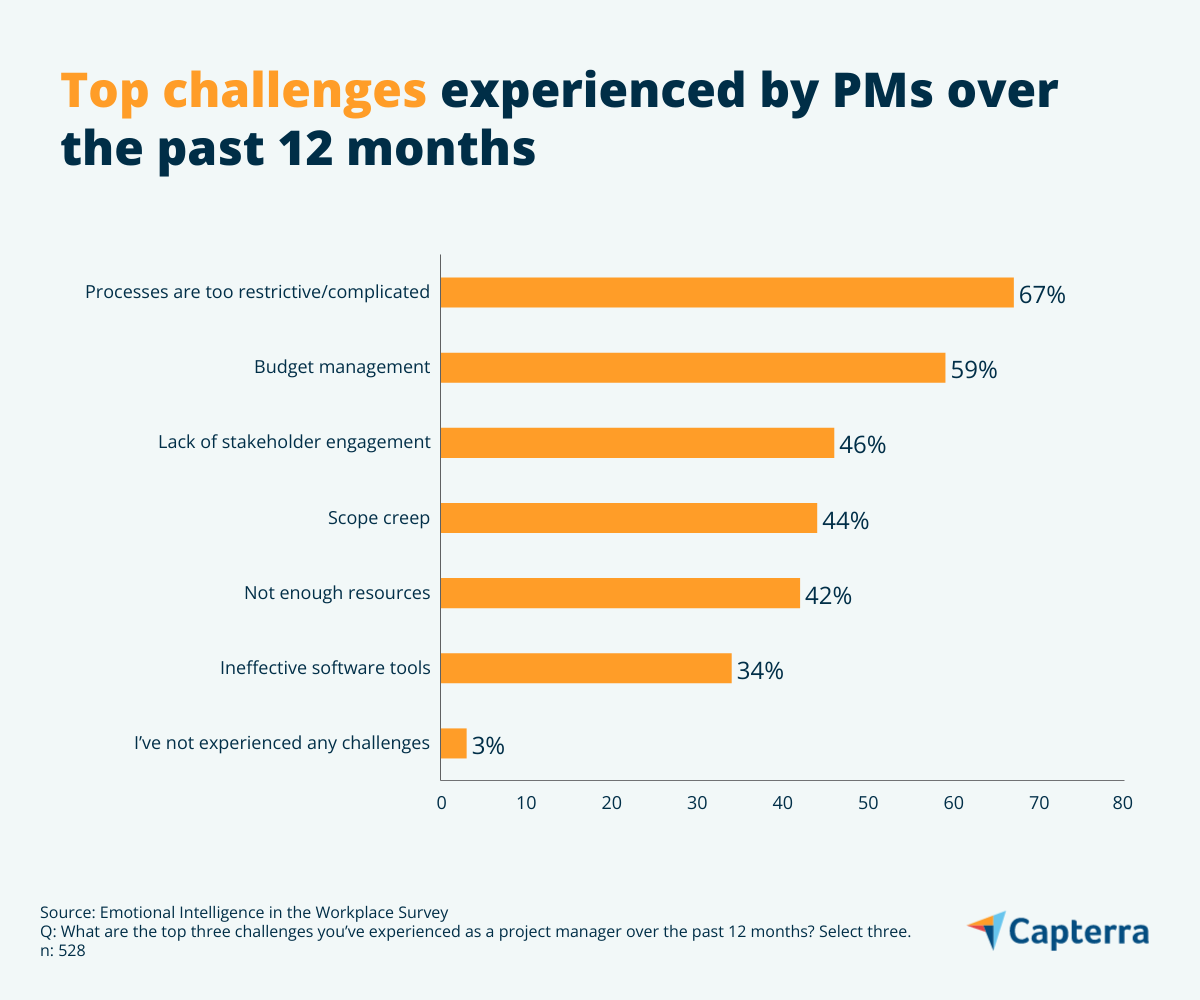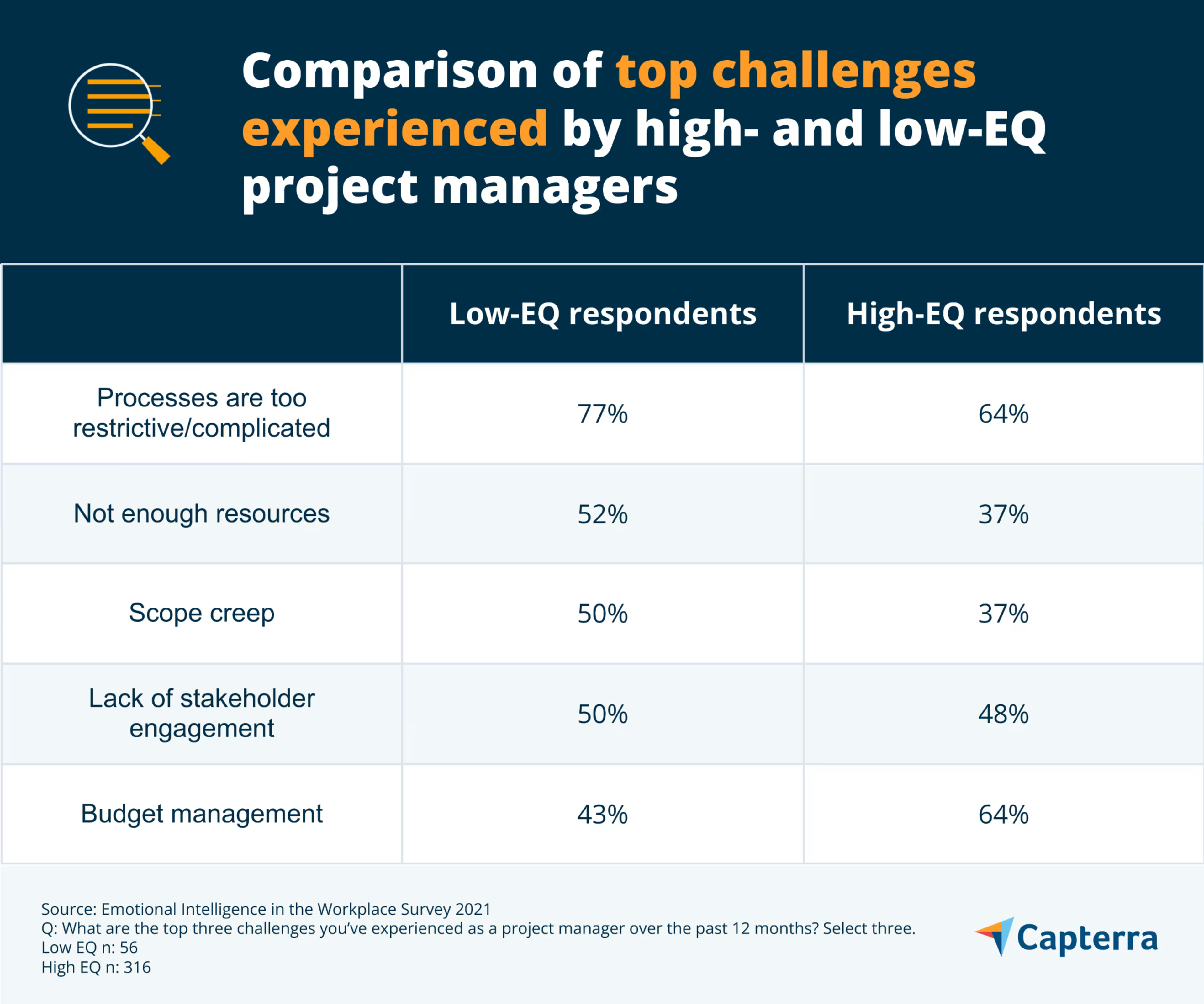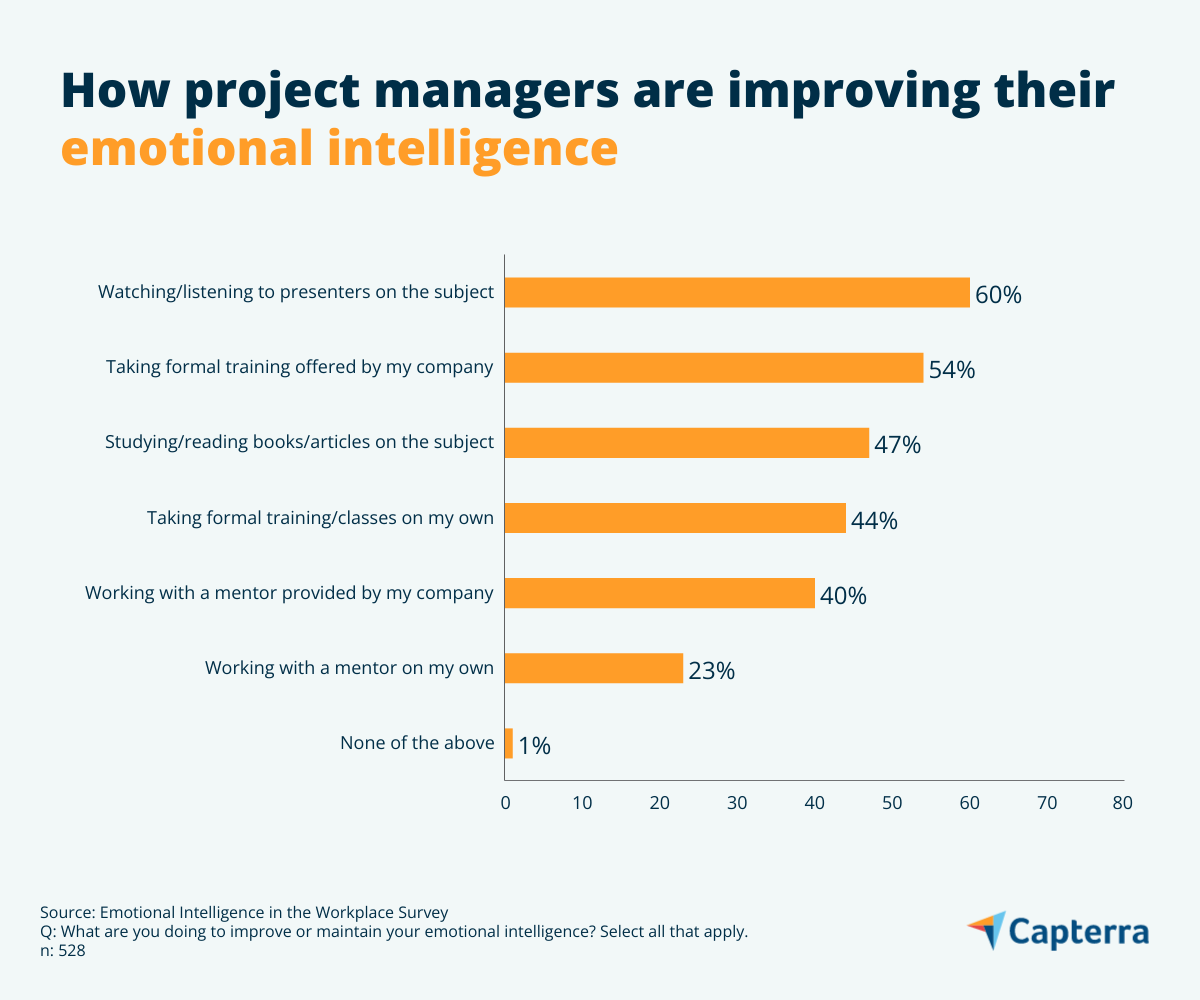PMs see the value of high EQ as they lead teams through projects ranging from IT to manufacturing to accounting.
In a recent survey, we found that emotionally intelligent project managers (PMs) are about 11% more successful at managing processes, engaging stakeholders, avoiding scope creep, and efficiently using resources compared to PMs who lack this skill.
As a PM, emotional intelligence is critical to your position—herding cats is a crazy way to make a living but some social awareness and thoughtful engagement reduces the chaos. Emotional intelligence helps you ease stakeholder tensions and increase the ability to deliver high-value projects with engaged team members.
Read on to find out how emotional intelligence can address common challenges in your workplace and see how your EQ usage stacks up to your peers.
Key highlights
EQ has been and continues to be a critical soft skill—78% of PMs report using it more than ever in the past two years.
47% report that EQ is documented in their annual review. EQ matters for individual performance reviews; metrics that involve or are impacted by EQ are included in most PMs' performance reviews.
Low-EQ PMs struggle more than high-EQ PMs in four of the top five challenges experienced by PMs.
Honesty is the top trait for a high-EQ PM, according to 62% of respondents.
About the research: The purpose of this report is to understand how project managers use, acquire, value, and benefit from using emotional intelligence (also known as emotional quotient or EQ) to help their project management approach and work relationships. For this report, we surveyed 528 U.S-based professionals who manage projects at their small to midsize business (2 to 500 employees). Respondents were screened for their involvement in project management (extremely involved).
82% of respondents are certified project management professionals (PMP certified via the Project Management Institute) and another 9% are actively working towards certification.
What is emotional intelligence and why is it important for project managers?
Our definition of emotional intelligence follows the medical industry standard: Emotional intelligence is your ability to perceive, use, understand, manage, and handle your own emotions as well as others'.
Project managers are in the unique position of having to manage the engagement and expectations of all stakeholders in a project. And rarely will every stakeholder have the same motivations and interests for that project. As the PM, you must constantly communicate and negotiate with personality types of all sorts.
The pandemic has exponentially increased stress levels for everyone, which means navigating the social waters within a project team is trickier than ever. In response, most PMs (78%) report having increased their use of their EQ in the past two years in order to continue to lead successful project teams.
Here’s the full breakdown of how our respondents have changed their use of EQ.

Ineffective project processes are the top challenge
We asked project managers about the challenges they’ve experienced over the past 12 months and the top challenge reported by 67% of respondents is dealing with processes that are too restrictive and/or complicated. Budget management came in second (59%), and a lack of stakeholder engagement (46%) rounded out the top three.
Here’s a breakdown of all responses.

Note: We also offered “Other” as an answer option, but there were zero responses for it.
The good news here is that this top challenge of too restrictive/complicated processes can be addressed by talking to leadership about the changes you need to see made to your business processes… and EQ is the secret ingredient to making these conversations go your way. Be clear and specific in your ask and use your EQ soft skills to negotiate for what you need.
Next we'll take a closer look at the differences in challenges experienced by self-reported high-EQ versus low-EQ PMS. Then we'll get further into how EQ plays into the challenges PMs face.
PMs with lower EQ struggle with the challenges where soft skills are needed
We asked respondents to rank their own level of emotional intelligence on a scale of one to five (one being the lowest and five being the highest). Only 10% of all survey respondents report having a low EQ level of one or two. But let’s dive a little deeper into the differences seen between this group and the rest.
Here is a breakdown of top challenges experienced in the past 12 months by project managers with low versus high emotional intelligence.

We see here that for four of the top five challenges, the low-EQ PMs struggle more than the high-EQ ones. These four are also the types of challenges where one’s ability to negotiate and be persuasive are keys to improving them. (Budget management isn’t influenced by soft skills as much as the other challenges are.)
In order to understand how and why emotional intelligence is helpful in these challenges, we’ll need to use some examples. We’ll do just that in the next section.
One interesting finding is that 93% of low-EQ project managers report using spreadsheets and manual processes to manage projects versus just 44% of the high-EQ PMs. We won’t make assumptions that EQ and the use of PM software correlate. However, it is worth noting that the job of a project manager lacking both the proper tools (PM software and a high EQ) is more difficult than a PM equipped with one or both.
What emotional intelligence looks like in the real world of project management
Now let’s get into how to leverage your EQ to address these top challenges. We’ll use the example of an Agile project for an accounting software implementation.
Challenge:
Processes are too restrictive/complicated
EQ trait:
Asking questions before taking action
How to use this trait:
You’re prepping for a demo of new accounting software and over a dozen people are asking to be added to the meeting invite. Instead of mindlessly adding them, take a few minutes with each to understand what it is they want or need. Perhaps they want to know if the software has a specific feature or maybe they don’t understand their role in the project. In many cases, you’ll find out that the demo isn’t the best place for them to get the info they need and you can work with them in another way.
Challenge:
Budget management
EQ trait:
Transparent and honest communication
How to use this trait:
Your regular status reports should include updates on your project’s budget. Don’t shy away from sharing the honest state of the budget with the business/product owner and your manager. The current status and your educated projections need to be stated clearly in order to be able to make adjustments as needed before it becomes a problem.
Challenge:
Lack of stakeholder engagement
EQ trait:
Awareness and empathy
How to use this trait:
You notice a key stakeholder, say, the director of accounting, hasn’t attended the last several sprint demos for the project. Their lack of engagement is slowing down your team’s ability to get feedback and approval on features you know are important to them. When you schedule one-on-one time with them, they tell you that their schedule is just too packed and they aren't familiar enough with the day-to-day tasks of the team using the system. Together, you choose a senior manager to take over that role on the project. The senior manager is then excited to take on this active role and is highly engaged with the project team.
Challenge:
Scope creep
EQ trait:
De-escalating emotions and conflict resolution
How to use this trait:
A hot-headed stakeholder joins one of the final meetings before the go-live date and is aggressively requesting a list of several new features. You acknowledge their request and the urgency they are asserting, but remind them of the purpose of the current meeting and make plans to connect with them right after. You later negotiate with them to work with the business analyst to document their requirements and will deliver them in a second phase of the project.
Companies are helping PMs improve their EQ with formal training and mentorships
We asked our survey respondents what they’re doing to improve or maintain their emotional intelligence for their role as project managers and found out that companies are offering more support than expected.
The majority (60%) watch and/or listen to speakers and presenters on EQ. Fifty-four percent of respondents say they’re taking formal training on EQ and 40% work with a mentor, both offered by their company.

Note: Six respondents report not working on improving their EQ; these six are also the 1% that selected “None of the above” in the chart above. We also offered “Other” as an answer option, but there were zero responses for it.
Since you’re reading this report, you’re in the 47% of PMs who are reading up about emotional intelligence. But is your company offering support, as well? If not, now’s the time to make the request. Use these numbers to show your manager or project management office (PMO) that many companies are already providing professional development for EQ and that you deserve it also.
Recently, I worked with The Digital Project Manager team to record a podcast on EQ for PMs. You can check it out here. In it, I make the case for how watching shows such as HBO’s "White Lotus" can help you improve your EQ by identifying when characters are good or bad at it. (In case you’re looking for a reason to watch well-written character analyses.)
Other PM and EQ trends seen in the results
Here are some other key points we gathered from our survey:
62% of respondents report managing budgets averaging $50,000 to $200,000 per project.
63% of respondents report managing two projects at a time.
80% of respondents have been managing projects for five years or less.
IT is the department with the highest number of respondents at 37%, accounting is second at 12%, and project/product management is third at 8%.
“Services: information technology services and software” is the top industry at 21%, followed by “banking/financial services” (14%) and “manufacturing” (10%).
If you’d like to continue learning about project management trends and what your peers are doing, here are a few more articles we recommend. (Spoiler alert, they're written by me.)
The Future of Project Management is Hybrid
“The future of project management success belongs to the project managers (PMs) breaking the functional corporate silos as we know them. Successful PMs will be the ones who work with a hybrid approach and mindset.”
Rediscover the Strengths of Traditional Project Management
“Don’t make the mistake of thinking that traditional project management is somehow subpar or even uncool now that agile is the new kid on the block. Agile has its place, especially in software development projects. But project managers need to know the classic approach to managing projects.”
What is DACI: An Explainer
“A DACI (aka, RACI) matrix is your best tool for making quick and effective decisions during any project. We’ll explain why and give you 5 tips for creating one.”
